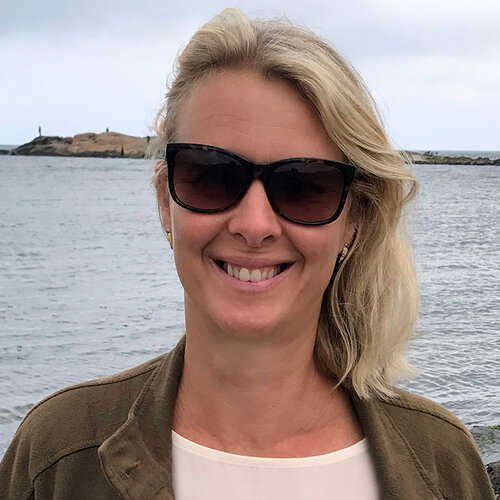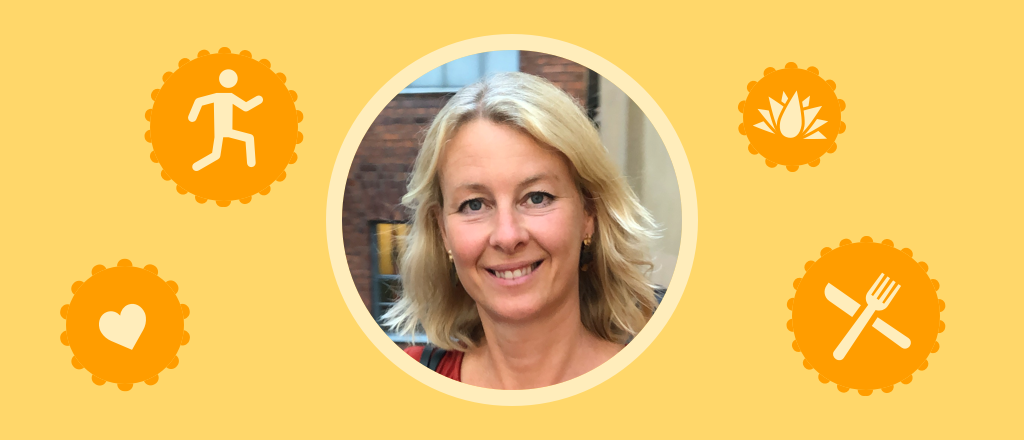“The insights helped me create a healthier life”
As a researcher, Gabriella Wennblom dealt with her diagnosis of rheumatoid arthritis (RA) with a rational, knowledge-based approach. Gradually, she began to realize that other things can be at least as important as forgiving her body, asking for help and taking responsibility for her own health.
Guest Blogger: Gabriella Wennblom
In the middle of my life, aged 49, I was diagnosed with arthritis (RA). It was the day New Year's Eve 2019 that the doctor called and told me. Beside me on the couch in a mountain cabin sat my dear friend, who is also a rheumatology nurse. Every now and then, after a little attack of crying, she comforted me and said it would settle down. “You will be given medication and today there are good medicines. Hopefully, you will be able to live your life as you have lived it so far. "
The journey since then has, against expectation, changed my life for the better. I have learned a lot about myself and what I need to feel good. Today, strangely, I feel stronger than ever. Perhaps it is also because the fatigue I suffered in the autumn has diminished and the mysterious pains have been explained and that I am now pretty much symptom-free. But I also think there are explanations related to the insights I gained.
Feelings affect you
Initially I dealt with my diagnosis rationally and with a solution-oriented approach. Being a researcher by profession, I attacked the diagnosis methodically and systematically. I created a knowledge base I could base my decisions on. I felt I had "kept track of the situation", felt confident and confident that this was the right thing to do. The physical problems decreased with the help of my medicines and then the emotions caught on. I began to realize that I was disappointed and angry with my body. I mourned the body I had had until then.
I went on a yoga trip, and in the middle of a session I had a vision. I saw myself as a 13-year-old, running on a beach, full of strength and joy. I told her I was so happy for her, and that she would be fully healthy for 49 years. I had not been able to think like this before, only seeing the misery that had struck me. I felt so grateful for what the girl - I - would experience and how her body would carry her strong and proud through life. I felt so happy about what she would get - and therefore, indirectly, what I had received.
This insight enabled me to move on. Understanding what you really feel, what your emotions mean and how you can manage them is, I think, very important. It was especially important to me, after I initially believed the "scientifically rational method" would suffice.

Doing things to feel good
In everyday life, I use a routine that is important to me. It is based on the fact that mentally activity, like work, always requires rest - and that you also need physical activity, for example running or walking in nature, every day; and this requires rest too. I have a stressful job that unfortunately is sedentary. This must be balanced with physical activity and rest.
If I am in pain, I always try to deal with it first and foremost with physical activity. The swelling and pain usually tend to subside after that. In fact, when I was at my worst during the autumn I thought, after every workout, that I just was just imagining I was sick, because for hours after exercising I didn't feel any pain at all. I have also thought more about my diet and what works for me.
I have also tried to learn more so I can understand the diagnosis. I have read knowledge-based texts but also taken on the experiences and stories of others. With knowledge and a learning approach, you can go a long way towards relieving uncertainty and worry. I have also written down all the thoughts and feelings I have had. It has made me:
See more clearly what I can change myself
Know what I need help with
Understand what I can’t do anything about
Talk openly about your diagnosis with people who will listen
In order to get the support I needed, it was important that I was willing and able to talk about my diagnosis. I have actively sought support and raised my problems with everyone who has been able to listen. Often I have received tremendous support. I've forced myself to think a little selfishly. Now it's my turn to be listened to! Above all, my children have been so nice. They have gently felt my swollen fingers and asked "Are you hurting now?". That cannot be bought for money.
We need support from others. I believe we are all social beings and we have a strong need for understanding and acceptance. That’s especially important when we are weak, and we must be grateful that people are there.

My own healthy version of the diagnosis
Getting a rheumatic diagnosis at 49, when my body felt like a total disaster. Partly because of all the physical fears; what will happen to my body now? Why has my body abandoned me, when before it has always stood by my side? But perhaps above all, it felt like a disaster for my self-identity, as I have always seen myself as a "healthy and strong" person. I simply could not identify with the disease. At first, I associated my diagnosis solely with illness. Now I associate it with a healthier life.
I realized I had to create my own version of my diagnosis. There is a common expression: "I am not my disease." I want to go a step further and say, "This is my version of my illness" and "I am my version". Taking myself seriously has become a very important responsibility for me now, after my diagnosis. To influence what I can, to accept help if needed and to let go of what I can do nothing about.
